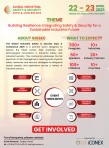- Spinny\'s \'Sweet December\' Campaign Delivers Christmas Magic to Second Lucky Winner
- WebbyAcad Launched Free OST Converter Tool (ver 1.7.0)
- Nutrax Launches Isolate Whey Protein Powder in Different Flavors
- Captivating Performances Mark the Second Day of Bharatmuni Rang Utsav 2024
- AAFT School of Hospitality and Tourism Showcases Iranian Cuisine at the 17th Global Film Festival
- Diving Deeper in Rare Disease Research: Protheragen Unveils Diagnostic Development Services
- AI is an Enhancement, not a Challenge: Insights from MIT-WPU’s CXO-Entrepreneurs Alumni Meet 2024
- Ace Therapeutics Accelerates Preclinical Depression Investigation by Providing Depression-Related Behavior Tests
- India at Work 2024 Report by Apna.co reveals over 7 crore job applications, 12 lakhs jobs posted in 2024
- Geetanjali International Foundation Celebrates the 5th Edition of Sant Shiromani Surdas Mahotsav
- Euro Energy Resources Limited Announces New Medical Battery Solutions in Leicester
- Matrimony.com announcing the launch of a new specialised service, Make My Wedding
- Hyatt Jaipur Malviya Nagar Rings in 2024 with Dazzling Disco Night
- Relaxo Launches 'Festive Fiesta Offer' with Big Savings on Footwear Across Brands
- Style Condoms Unveils New Identity with #StyleHarBaar Campaign and Three New Condoms
 Mail to a Friend Mail to a Friend |
|
     |
Illinois is Putting the Brakes on Red Light Cameras
Red light cameras have been in the news since the 1990's when cities and municipalities began adopting them to aide with the enforcement of traffic laws. Ostensibly, the never blinking eyes were intended to augment the reach of police departments within the communities they were placed. Over time, the practice of using red light cameras to deter speeding and reckless driving became less about law enforcement, and more about generating revenue.
That's the position Illinois Representative David McSweeney has taken and used to convince the Illinois House to pass legislation that would ban red light cameras from operating within 35 Illinois communities. McSweeney's initial proposal would have banned their use in Chicago, however, House Speaker Michael Madigan and others objected to its inclusion.
The proposed legislation passed the house with 79 members supporting, and 29 opposing. And, while the bill has better than even odds of passing the Senate, it's anyone's guess as to whether or not Governor Rauner will sign it into law.
"As an auto accident lawyer in Chicago, I see plenty of cases where speed and careless driving have caused serious accidents. And, while cameras can help slow motorists down and make dangerous intersections safer, cameras can't be placed everywhere. Furthermore, the red light cameras were installed with the promise of decreasing accidents. Over time, that's changed and the reality is that communities are using them as primary sources of revenue to support their budgets," remarked Cary Wintroub.
At $100 per ticket, there is a considerable amount of money at stake. Chicago's cameras alone generate nearly $100 million in revenue each year. Thus, it's not surprising that Chicago Mayor Rahm Emanuel isn't eager to remove them from the city. In fact, their installation was a key plank in his campaign platform that he was able to achieve in 2011 when the city government won the right to have them installed throughout the city.
"Should McSweeney's proposal become state law, it will remove cameras from Cook, DuPage, Madison, McHenry, St. Clair, Will, Kane, and Lake Counties. While this is likely to make motorists in these communities giddy with glee, it's very likely to upset the town and city governments. Without exception they will view this as an infringement on their right to govern over their cities," surmised Chicago auto accident attorney Cary Wintroub.
Company :-CARY J. WINTROUB & ASSOCIATES
User :- Cary J. Wintroub
Email :-cjw.law25@gmail.com
Phone :-312-726-1021
Mobile:- -
Url :- http://www.cjw-law.com/










